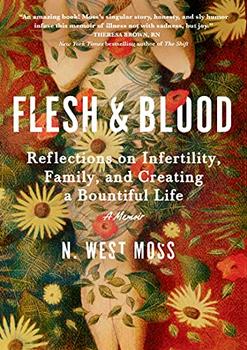Summary | Excerpt | Reading Guide | Reviews | Beyond the Book | Read-Alikes | Genres & Themes | Author Bio

Reflections on Infertility, Family, and Creating a Bountiful Life: A Memoir
by N. West MossThis article relates to Flesh & Blood
In Flesh & Blood, author N. West Moss writes of her struggles with infertility, detailing her emotional reactions to miscarriages and an illness resulting in a hysterectomy. The feelings, experiences and circumstances surrounding an inability to conceive are multifaceted and varied, and so are the works of literature that have addressed it as a subject. Below are five books that deal with the personal fallout of infertility and its broader effects.

Brood by Jackie Polzin
Kirkus Reviews calls Flesh & Blood "similar in spirit" to Jackie Polzin's novel Brood, as both books are about women who grapple with their inability to have children while immersing themselves in the animal world: In Moss's case, a praying mantis and cats; for Polzin's protagonist and first-person narrator, the chickens that she cares for with her husband Percy. Unlike in Flesh & Blood, this unnamed narrator remains somewhat mysterious to the reader, as she avoids giving too much information about herself, including the details of a previous miscarriage. Her thoughts about and interactions with the chickens serve to show her parental instincts and inclinations, while also portraying her relationship with the birds as unique and worthwhile in itself.
Yolk by Mary H.K. Choi
While told from the point of view of first-person narrator Jayne Baek, a college student living in New York City, the bulk of the young adult novel Yolk revolves around her sister June's cancer diagnosis and the upcoming hysterectomy she is required to undergo. June, who is only 23, is forced to consider her future prospects when it comes to having children at an age where many people have not even begun to think about this. Her emotions surrounding her impending infertility are complicated by the girls' murky knowledge of their mother's "dead baby," a child she lost and was still mourning during their childhood. The practical specifics of June's medical treatment also form part of the drama, as she has no health insurance and assumes Jayne's identity in order to pay for her operation.
The Art of Waiting by Belle Boggs
This memoir by Belle Boggs, author of the short story collection Mattaponi Queen, details her personal struggles with infertility alongside the struggles of others dealing with similar situations, extending to people who have adopted and considered surrogacy. Boggs' book is an expansion of her essay of the same name, which went viral after appearing in Orion Magazine in 2012, and was later republished in Harper's. Like Polzin and Moss, Boggs places the subject of infertility in the natural world. She writes, "It's spring when I realized that I may never have children, and around that time the thirteen-year cicadas return, burrowing out of neat, round holes in the ground to shed their larval shells, sprout wings, and fly to the treetops, filling the air with the sound of their singular purpose: reproduction."
Little Fires Everywhere by Celeste Ng
Ng's novel examines infertility through two plot points: The story of an immigrant mother, Bebe Chow, who abandoned her baby under desperate circumstances and has now lost the child through adoption to a couple who cannot conceive, and the story of a former surrogate and current single parent, Mia Warren, whose past has shaped her present. Little Fires Everywhere explores the ethics of various situations that may arise due to infertility, taking into account factors such as economics and race, and raising the complicated question of who deserves to be a parent.
Detransition, Baby by Torrey Peters
Peters' debut novel focuses on Reese, a trans woman who longs to be a mother but is faced with the limited options open to her for starting a family. When Reese's ex-partner Ames, who was formerly known as a trans woman named Amy but has detransitioned to live as a man, unexpectedly impregnates his current girlfriend and boss, Katrina, he considers that the three of them could raise the child together, giving Reese the chance at parenting she has always wanted. Even as the characters agree to tentatively move forward with this arrangement, Reese continues to deal with a sense of helplessness regarding her own biological inability to have children, making the novel a simultaneously sad and hopeful exploration of womanhood and motherhood.
Filed under Reading Lists
![]() This article relates to Flesh & Blood.
It first ran in the October 20, 2021
issue of BookBrowse Recommends.
This article relates to Flesh & Blood.
It first ran in the October 20, 2021
issue of BookBrowse Recommends.
Your guide toexceptional books
BookBrowse seeks out and recommends the best in contemporary fiction and nonfiction—books that not only engage and entertain but also deepen our understanding of ourselves and the world around us.